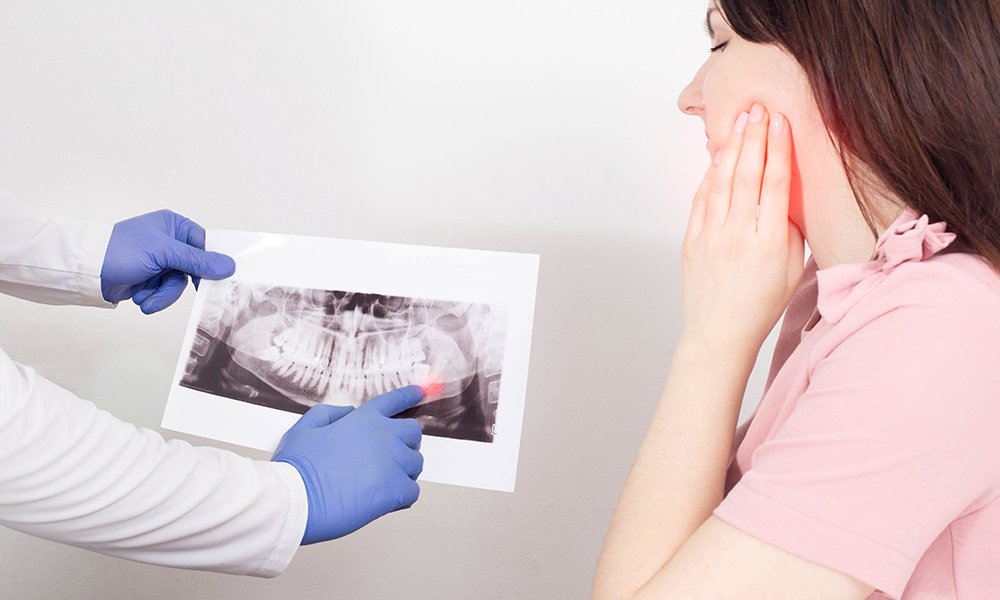Wisdom Tooth Extraction in Hamilton
Your wisdom teeth can cause more harm than good
Do you have your wisdom teeth?
Contact us today if you are having any pain
or discomfort in the area of your wisdom teeth.
We can discuss your options and determine if
our wisdom teeth extraction in Hamilton is best for you.
Wisdom teeth Impactions
Your dentist may refer you to us for extraction of a tooth. Or you may want to call our office if you’re having pain or symptoms related to your wisdom teeth. The ideal time to have these teeth removed is before you’re 25 years old, but it is possible to remove them at an older age. We have the specialized staff, skillset and equipment that makes getting out broken, impacted, infected or otherwise difficult teeth much easier and less stressful. In conjunction with a wide range of anaesthetic options available such as IV sedation or general anaesthesia, even removing difficult teeth can be uneventful and a positive experience.
Speaking of experience – experience counts! Our oral surgeon has six years of additional training in oral surgery beyond dental school. Both he and our anaesthesia providers have received post graduate training in sedation and anaesthesia to make this an even safer and more comfortable treatment option for you.
What are wisdom teeth?
Wisdom teeth are known as the third molars, and are the last teeth to develop. It may take until your late teens or early twenties for them to mature and emerge from your gums, if they emerge at all. They are called ‘Wisdom Teeth’ because they develop at a time when you have made the transition from childhood to adulthood bringing with it wisdom – at least that’s how the story goes.
In many cases some or all of these teeth remain impacted (or trapped), in whole or in part, in the jaw bone and gums, usually because there is not enough room for them in your mouth. In fact, partly erupted teeth can be the most troublesome. Due to advancements in dental care we no longer lose our first or second molars in childhood and therefore do not need these late developing teeth. In fact, keeping these teeth often do more harm than good; because of this, your dentist may recommend removing them and refer you to a specialist for care.
What are symptoms of impacted teeth?
Hopefully, the dentist catches any problems with your wisdom teeth early. As long as you keep up your regular appointments and get appropriate imaging (X-rays), your dental care provider can spot potential problems in time to prevent an issue from developing. However, if a wisdom tooth is impacted and becomes infected, you might experience the following symptoms – these are usually signs for wisdom tooth removal:
- Red, tender, bleeding or swollen gums
- Jaw joint pain or aches
- Headaches
- Swelling around the jaw
- Halitosis (chronic bad breath)
- A sour taste in your mouth
- Difficulty opening and closing your mouth
- Occasional swollen lymph nodes in the neck
If you are experiencing any of these symptoms, please contact us to schedule an appointment to discuss how we can help you.
What is involved in removing wisdom teeth?
The process usually starts with a consultation where the Doctor will review your medical history, examine your mouth and evaluate your imaging. A recent panoramic radiograph gives the best information on root size and position relative to other anatomic structures in the jaw bone. Your particular situation will be discussed in detail so that you understand any potential risks and benefits of surgery. Additionally, the Doctor will discuss various anaesthesia options including local anaesthesia (freezing), nitrous oxide (laughing gas), conscious sedation (being drowsy) or deep sedation (being asleep). On the day of surgery you will be asked to come in on an empty stomach if you are going to have a sedation or general anaesthetic. You will also need to come with a responsible adult who will take you home and care for you while you are under the influence of the anaesthetic medications. This procedure, which is usually done in our office, takes about an hour. Any stitches placed will dissolve on their own. We provide an environment of optimum safety and comfort. Our facilities are equipped with modern monitoring equipment and our surgical team is experienced and trained in anaesthesia techniques.
How can I manage swelling after wisdom tooth extraction?
Swelling is a common side effect of wisdom tooth extraction. To manage swelling, you can apply an ice pack or a cold compress on the outside of your face over the extraction area. Apply it for 15 minutes at a time, with 15-minute breaks in between. Doing this for the first 24 to 48 hours can help reduce swelling.

What problems can your third molars cause?
Most people have four wisdom teeth, one in each corner of their mouth, but each tooth may be at a different stage of eruption or position of impaction. In some cases if you have had orthodontics or braces, your orthodontist may want your wisdom teeth removed to help preserve your teeth and bite. Sometimes problematic wisdom teeth can cause local pain and swelling, usually due to food or debris getting trapped around the tooth with no way of cleaning the area. In some cases, you may not feel any symptoms at all until considerable damage has been done. This can be the case when the wisdom teeth decay and cause the neighbouring molar to decay or to develop gum disease as well. In rare situations, the sac that surrounds a developing wisdom tooth can lead to the formation of a cyst or tumour which can cause problems in the jaw bone.
What happens if I wait on wisdom tooth removal?
Many professionals go head-to-head on this very issue. Some dentists say it is best to remove wisdom teeth around the age of 20, while others say to wait and only remove them if there is a problem. The latter is especially true for adults over the age of 30. At Downtown Sleep Dentistry and Oral Surgery our best advice is to have a consultation early so our oral surgeon can determine the best treatment plan for you. Everyone is unique, and many times after a consultation appointment we have recommended that people either wait or do not have their wisdom teeth removed. The best results in dentistry comes from preventative measures. If you wait too long for wisdom teeth removal, your jawbone and teeth will begin to set into place. As they get harder, the third molars are even more difficult to remove and the procedure becomes even more complex.
Waiting on wisdom teeth that need to be extracted can create a greater risk of postoperative side-effects like sinus issues, nerve problems or numbness, damaged tooth roots in healthy teeth and limited jaw movement. These symptoms might last only a couple of days or become a long-term issue. You should always consult with a specialist to see where your teeth are and to determine whether problems are likely to arise in the future. Once this is decided, you and your dental specialist can work together to find the best treatment options for your unique needs.
Will I experience pain following wisdom tooth removal?
A little discomfort and pain following wisdom tooth removal is typical. To help you manage the pain, your oral surgeon or dentist will prescribe painkillers. Ibuprofen and other over-the-counter painkillers can also be used as prescribed. Usually, the discomfort goes away in a few days to a week.

How long does recovery from wisdom tooth removal take?
A wisdom tooth extraction requires about a week to fully recover from, though recovery times can vary from person to person. However, the first week or so of healing is typically required. To encourage proper healing, it’s crucial to adhere to the post-operative instructions given by your oral surgeon or dentist.
Call: 905.528.8959
Working Hours
Monday – Friday from
8 a.m. – 3:30 p.m.
Consultation
We are here to answer any and all questions you may have regarding your sedation dentistry appointment.


